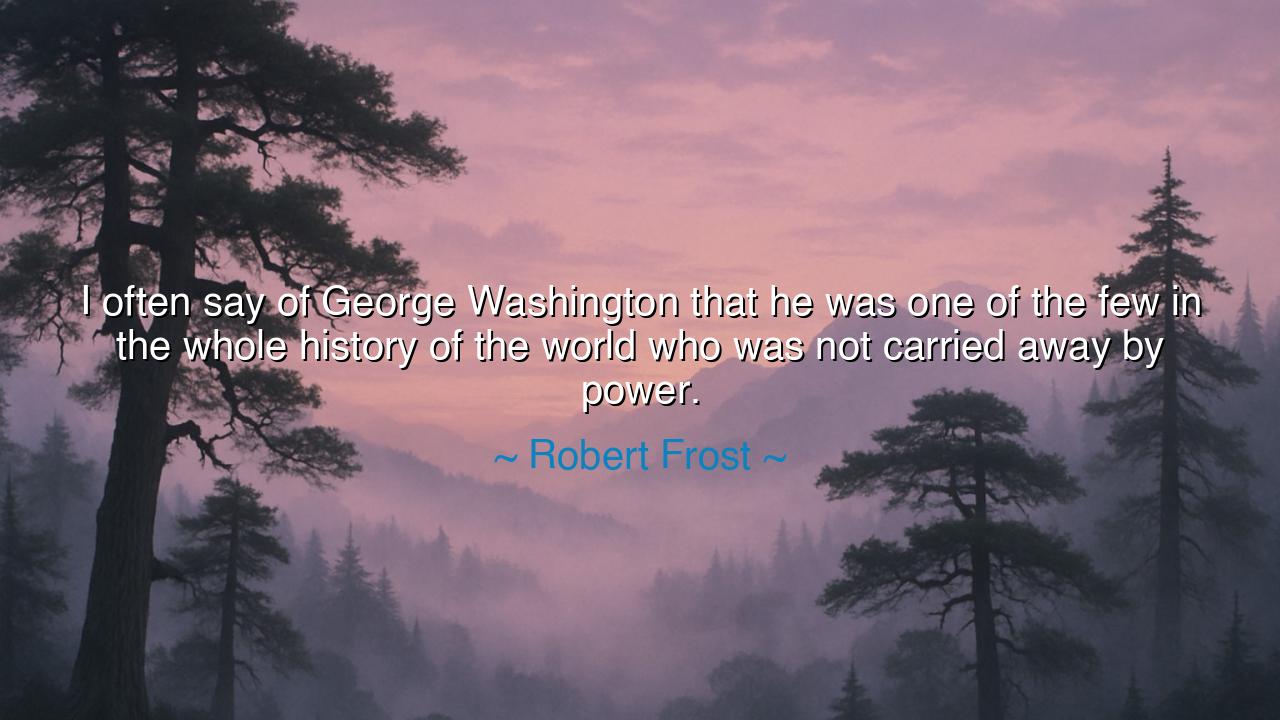
I often say of George Washington that he was one of the few in
I often say of George Washington that he was one of the few in the whole history of the world who was not carried away by power.






Hearken, children of the ages, and open your hearts to the reflection of Robert Frost: “I often say of George Washington that he was one of the few in the whole history of the world who was not carried away by power.” Understand this: the seduction of authority is ancient and relentless, testing the hearts of kings, generals, and magistrates alike. To wield power without being consumed by it is a rare virtue, one that separates the transient ruler from the immortal leader. Frost calls our attention to a truth long revered by sages: greatness lies not only in command, but in restraint, humility, and fidelity to principle.
From the annals of antiquity, we see examples of this moral fortitude. Cincinnatus of Rome, called from his plow to defend the Republic, led with decisiveness, yet relinquished power willingly when the crisis passed. Frost’s admiration of Washington mirrors this ideal: the ability to resist the intoxicating lure of authority, to act for the good of the people rather than for personal aggrandizement, is the mark of a leader worthy of remembrance. Not being carried away by power is itself a triumph, rarer than conquest or victory.
Even in the courts of medieval Europe, rulers were often consumed by their own ambition. Kings amassed wealth, armies, and influence, yet few restrained their desire for dominion. Washington’s unique character, as Frost observes, was forged by principle and tempered by responsibility. His surrender of power after the Revolutionary War, declining the opportunity to become a monarch or perpetual ruler, exemplifies the virtue Frost venerates: the subordination of self-interest to the welfare of the republic.
Consider the story of Washington at the Constitutional Convention. Though offered opportunities to extend his influence indefinitely, he acted with prudence, ensuring that the fledgling nation would be governed by laws and institutions rather than personal authority. His foresight and humility echo the wisdom of the ancients: the true measure of leadership is not the magnitude of power exercised, but the restraint and moral integrity with which it is wielded.
Frost’s reflection also speaks to the enduring relevance of character in leadership. History is filled with figures whose brilliance was eclipsed by hubris. Alexander the Great, Napoleon Bonaparte, and Julius Caesar achieved astonishing feats, yet were at times carried away by the intoxicating power they held. Washington stands apart: his legacy endures not merely because of victory, but because he embodied the ancient ideal of self-discipline and devotion to principle.
The lesson is timeless: power is a test of the soul, a challenge to humility and virtue. To lead wisely is to recognize the weight of responsibility, to temper ambition with conscience, and to act for the good of many rather than the aggrandizement of self. Frost reminds us that the preservation of freedom, justice, and trust depends upon leaders who are not seduced by authority, but guided by enduring moral compass.
Practical action flows naturally. In your own life, whether in leadership, influence, or daily decision-making, cultivate self-awareness, temper ambition with humility, and act with integrity. Resist the allure of unchecked authority, and prioritize the welfare of those entrusted to your care. By doing so, you honor the enduring lesson of George Washington as articulated by Frost: that restraint and principle are as vital as skill and vision.
Children of the ages, remember this: the true measure of greatness is not in the exercise of power, but in the mastery of self. Let the words of Robert Frost guide your conscience and your deeds: lead with humility, resist temptation, and be among the rare few who are not carried away by power. In this lies the enduring glory of leadership and the preservation of liberty across generations.






AAdministratorAdministrator
Welcome, honored guests. Please leave a comment, we will respond soon